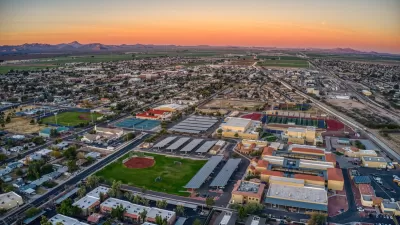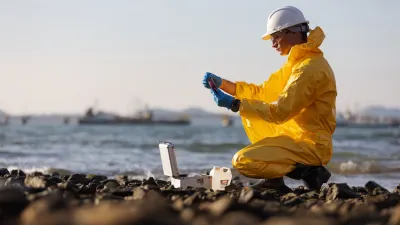The Colorado River is struggling to provide enough water for 25 million people, which could lead to water shortages and water wars in the areas that rely on its bounty. Officials are looking to find a long-term solution, reports Felicity Barringer.
"As far as future water supplies go, the outlook is not good," says Barringer. "Most Colorado River water is currently used for agriculture, but that is beginning to shift as the cities of the Southwest continue to grow." The basin is next to fall victim to America's water crisis as the demand for water exceeds supply, and the effects of climate change could bring less rain to the region. The Bureau of Reclamation has been considering traditional solutions to the water shortage including "decreasing demand through conservation and increasing supply through reuse or desalination projects," but "a more extreme and contentious approach" is the building of a 600-mile pipeline from the Missouri River to Denver that would provide water as needed and store the remaining in reservoirs. Experts say "the plan is reminiscent of those proposed in the middle of the last century, when grand and exorbitant federal water projects were common place — and not, with the benefit of hindsight, always advisable," which shows just how serious the problem has become for the Colorado River.
The pipeline would provide the Colorado River with 600,000 acre-feet of water annually from the Missouri and Missippi River systems, enough to serve roughly a million single-family homes, but the loss of water from those rivers would likely face strong opposition from the affected states. The project would also require local taxpayers and utility customers to shoulder the costs of the project, which could cost billions of dollars. The proposal "shows you the degree to which water-short entities in the Colorado River basin are willing to go to get water" from somewhere elsewhere, said Burke W. Griggs, the counsel for the Kansas Agriculture Department's division of water resources. If the Colorado River cannot supply enough water, the fear is that water wars could restart as states fight over dwindling water sources. Jason Bane of Western Resource Advocates described the pipeline idea as "fundamentally 20th-century water-policy thinking that doesn't work in the 21st century" and said, "We clearly need to conserve and be more efficient with the water we have."
FULL STORY: Water Piped to Denver Could Ease Stress on River

Planetizen Federal Action Tracker
A weekly monitor of how Trump’s orders and actions are impacting planners and planning in America.

Maui's Vacation Rental Debate Turns Ugly
Verbal attacks, misinformation campaigns and fistfights plague a high-stakes debate to convert thousands of vacation rentals into long-term housing.

San Francisco Suspends Traffic Calming Amidst Record Deaths
Citing “a challenging fiscal landscape,” the city will cease the program on the heels of 42 traffic deaths, including 24 pedestrians.

Amtrak Rolls Out New Orleans to Alabama “Mardi Gras” Train
The new service will operate morning and evening departures between Mobile and New Orleans.

The Subversive Car-Free Guide to Trump's Great American Road Trip
Car-free ways to access Chicagoland’s best tourist attractions.

San Antonio and Austin are Fusing Into one Massive Megaregion
The region spanning the two central Texas cities is growing fast, posing challenges for local infrastructure and water supplies.
Urban Design for Planners 1: Software Tools
This six-course series explores essential urban design concepts using open source software and equips planners with the tools they need to participate fully in the urban design process.
Planning for Universal Design
Learn the tools for implementing Universal Design in planning regulations.
Heyer Gruel & Associates PA
JM Goldson LLC
Custer County Colorado
City of Camden Redevelopment Agency
City of Astoria
Transportation Research & Education Center (TREC) at Portland State University
Jefferson Parish Government
Camden Redevelopment Agency
City of Claremont





























